Temperature differences in the autumn-spring period are for many a test of strength. Accustomed to summer heat, the body is suddenly attacked by cold air and a piercing wind. Often, the result is numerous colds, sometimes requiring lengthy treatment and nervous and financial expenses.
What is meant by the everyday word "cold"? There is a whole arising as a result of hypothermia of the body, or, acute respiratory infections. Colds are usually accompanied by inflammation of the mucous membranes, which invariably leads to rhinitis. People often refer to catarrhal diseases, which is fundamentally wrong, because these diseases have pathogens - viruses.
Catarrhal phenomena develop gradually, while viruses infect most often suddenly, accompanied by a jump in temperature. With a cold, the following symptoms gradually increase:
- Worsening runny nose, sometimes sore throat;
- When the swelling passes from the larynx to the bronchi, a cough begins;
- Signs of general malaise: weakness, aching, lack of appetite;
- The temperature does not rise above 38 ° C;
Respiratory disease, if ignored, causes bronchitis, sinusitis, otitis media, rhinitis, tonsillitis, pneumonia, laryngitis, pharyngitis.
Frequent colds are the result of malfunctions in the human immune system, caused by a variety of reasons.
Decreased immunity - the cause of frequent colds
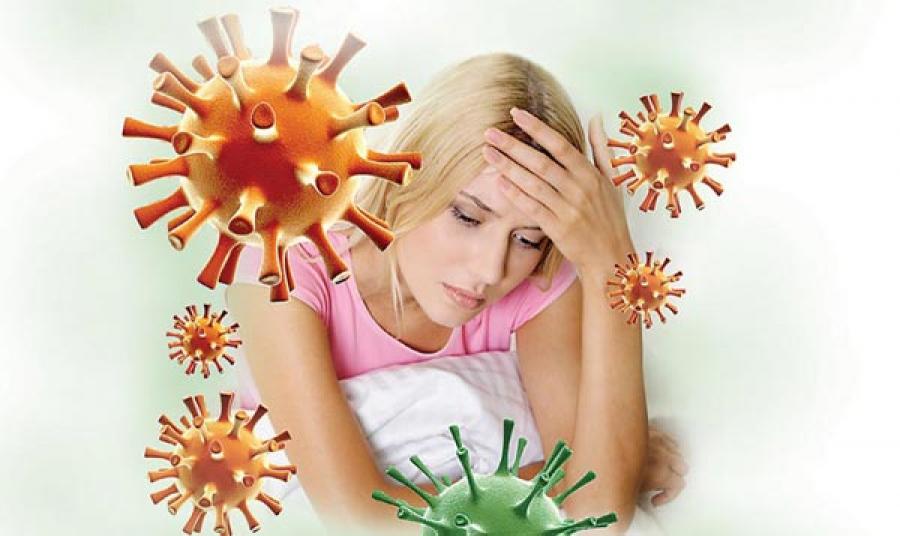 Immunity is given to a person from birth, and when disease resistance has a high threshold, they say that a person has good health. In fact, we are talking about the level of immunity, because it is he who is the main barrier between the human body and numerous pathogenic microbes.
Immunity is given to a person from birth, and when disease resistance has a high threshold, they say that a person has good health. In fact, we are talking about the level of immunity, because it is he who is the main barrier between the human body and numerous pathogenic microbes.
A high level of immunity can be provided at the gene level (hereditary) or artificially modeled (). Sometimes immunity to the disease is acquired as a result of a disease (acquired immunity).
If, for a number of reasons or even just one, the immune system is disrupted in at least one link, the human body begins to fail in attacks of diseases in different areas, and the upper respiratory tract, the gateway of infection to the body, is one of the first to be affected. As a result, frequent colds, up to 4-6 per year.
Signs of Immunity
It is quite problematic to determine the decrease in immunity on your own without additional studies, however, there are a number of signs, the presence of which may be the reason for going to the doctor:
- General health impairment (chronic fatigue, weakness, headaches, aching muscles and joints);
- Condition of skin, hair, nails (pallor and peeling of the skin, swelling under the eyes, hair dry and brittle, strongly fall out, nails pale and brittle);
- Protracted and and acute respiratory infections;
- Lack of temperature with a cold;
- Exacerbation of chronic diseases and an increase in the number of new diseases.
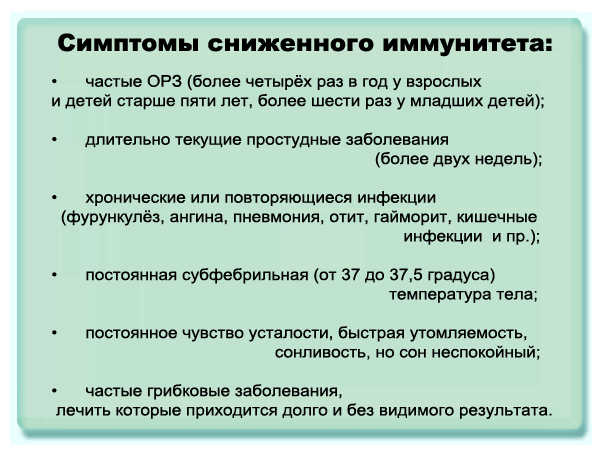
The occurrence of autoimmune diseases and frequent allergic reactions indicate a decrease in immunity - evidence of the malfunctioning of the immune system. The reasons for this may be the following:
- Unbalanced nutrition;
- Lack of physical activity;
- Unfavorable living conditions (lack of sleep, overwork, poor ecology);
- Uncontrolled intake of antibiotics.
The reasons for the decrease in immunity also include an increase in the level of hygiene in modern living conditions, which leads to "unemployment" and, as a result, weakening of the immune system. Often these same causes cause an allergic reaction when harmless antigens - pollen, house dust, volatile substances in cosmetics and perfumes - become the subject of an attack by immune cells.
Possible complications
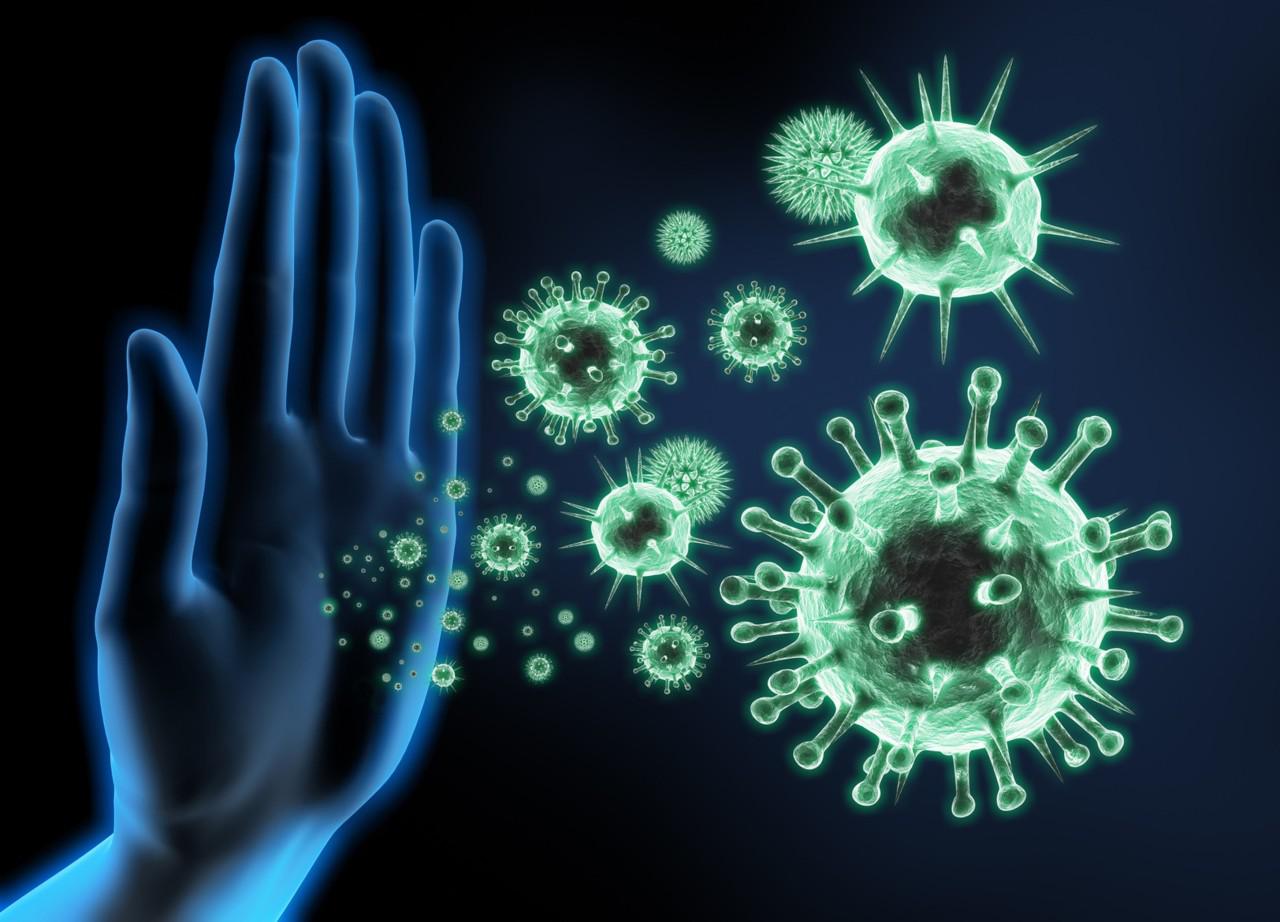 The consequences of a decrease in immunity are manifested in increased vulnerability to various infections and, in particular, colds. Infinite SARS and ARI attack a weakened body and do not receive the proper rebuff. As a result, there is a need to use more and more powerful drugs, which, in turn, further lower immunity.
The consequences of a decrease in immunity are manifested in increased vulnerability to various infections and, in particular, colds. Infinite SARS and ARI attack a weakened body and do not receive the proper rebuff. As a result, there is a need to use more and more powerful drugs, which, in turn, further lower immunity.
A lack of immunity often causes autoimmune and allergic diseases. Most often, against the background of an immune system dysfunction, multiple sclerosis, Crohn's disease, systemic lupus erythematosus, and rheumatoid joint diseases occur.
How to raise immunity
Raising immunity is a complex and painstaking task, which includes a number of measures aimed at eliminating a malfunction in a specific area of \u200b\u200bthe immune system. Identify this site can only be a qualified specialist.
Implementation of measures to raise immunity is necessarily coordinated with the attending physician or (in the case of drug therapy) by an immunologist. Self-medication is fraught with unpredictable consequences for the immune system and the whole body.
Hardening
 To obtain the desired effect of hardening procedures in order to increase immunity, it is necessary to have an idea of \u200b\u200bthe hardening mechanism. When some areas of the skin are subjected to rapid cooling, the body seeks to reduce heat loss by blood and lymph drainage from the cooled areas and narrowing of blood vessels. As a result, accelerated cleansing of tissues from toxins and dead cells occurs, they heal and rejuvenate, and their resistance increases.
To obtain the desired effect of hardening procedures in order to increase immunity, it is necessary to have an idea of \u200b\u200bthe hardening mechanism. When some areas of the skin are subjected to rapid cooling, the body seeks to reduce heat loss by blood and lymph drainage from the cooled areas and narrowing of blood vessels. As a result, accelerated cleansing of tissues from toxins and dead cells occurs, they heal and rejuvenate, and their resistance increases.
However, for the body this is a significant expenditure of energy, the burden falls on the kidneys, liver, and lymphatic system. And if a person does not have an energy reserve, then when quenching the resources necessary to activate the body can exceed the capabilities of the body. An overload of systems occurs, and instead of gaining health, a person gets a disease, often associated with a cold.
Before doing hardening procedures, you must feel and accept the principles of hardening:
- Revise life priorities and tune in to faith in the vitality of the human body;
- Plan the intensity and duration of hardening procedures based on the sensations of your body, observing the measure;
- Observe the principle of gradualness - the body must withstand loads at an increasing pace, and not take the record barrier on the move, otherwise there is a risk of injury instead of a high result;
- Like any medical procedure, hardening will only give results with regularly conducted activities. One missed procedure (like taking an antibiotic) can nullify previous results;
- Even with good health, tempering measures lead to significant energy costs, so after the procedures it is necessary to replenish them - rub with a hard towel or warm yourself in a hot shower (in the bath), and then put on warm clothes.
Hardening is one of the fundamental principles of increasing immunity, however, the approach to it should be as thorough as possible, since hardening procedures carried out illiterate can be harmful.
Physical exercise
 Movement is life, one of the most insidious enemies of modern man - physical inactivity. This is reflected in the immune system. Without movement, the speed of blood circulation decreases and lymphatic drainage slows down. This means increasing slagging of the body and a lack of essential nutrients in the tissues, which leads to immunodeficiency.
Movement is life, one of the most insidious enemies of modern man - physical inactivity. This is reflected in the immune system. Without movement, the speed of blood circulation decreases and lymphatic drainage slows down. This means increasing slagging of the body and a lack of essential nutrients in the tissues, which leads to immunodeficiency.
However, like hardening, physical activity should be observed in moderation, again based on the resources of the body. For example, for pensioners aged 60 - 70 years, 15 minutes of daily exercise is enough to significantly reduce the risk of strokes and heart attacks.
A young body is able to withstand much stronger loads, but here it is also necessary to know the line beyond which overload begins, and, therefore, harm instead of benefit. Intensive loads for 1.5 hours make a person susceptible to disease in the period of 72 hours after training.
Like hardening, physical activity gives positive results only in compliance with the principles of proportionality, regularity and gradualness.
Medications
Doctors resort to medications to increase immunity in the most severe cases. This is explained by the fact that the mechanism of the immune system is not well understood, the effect on some components can lead to inhibition of others.
However, there are several groups of drugs prescribed for a decrease in immunity:

- Plant immunostimulants: eleutherococcus, ginseng, Schisandra chinensis, Kalanchoe, echinacea, Rhodiola rosea, hawthorn, aloe;
- Animal preparations: thymalin, thymactide, thymogen, myelopid, T-activin, vilosen, immunofan;
- Means of microbial origin: Bronchomunal, Imudon, Lycopid, IRS-19, Pyrogenal, Ribomunil;
- Interferon Inductors (stimulants): Amiksin, Dipyridamole, Lavomax, Cycloferon, Arbidol, Kagocel, Neovir.
All medications for raising immunity have side effects, and self-medication with these drugs is fraught with unpredictable consequences.
Traditional medicine
Folk recipes for raising immunity include products containing a variety of vitamins and minerals necessary for the full functioning of all body systems. First of all, you should draw up a diet, where in sufficient quantities contains:
- Water (2.5 - 3 L);
- Dairy products;
- Garlic;
- Berries (blueberries, strawberries, raspberries), fruits (apples, persimmons, bananas, pomegranates), vegetables (carrots, bell peppers, pumpkin, squash);
- Seafood and saltwater fish;
- Nuts and seeds, honey and bee products;
- Meat and fish, legumes and eggs.

Each product contributes to the chain of normalization of processes in the body, including the immune ones. There are a number of recipes for raising immunity specifically:
- Ground Ginger Root (about 2 cm in length) is boiled in 2 l of boiling water for about 10 minutes. Drink a glass twice a day with the addition of honey and lemon;
- A mixture of honey and ground beef is taken 1 tsp. 3 times a day a quarter of an hour before meals;
- A decoction of rose hips (100 g of fruit per 1 liter of water is boiled for 5 minutes) is left for 8 hours to infuse, take 1 tbsp. l after meal;
- Boil a glass of crude oats in 800 ml of milk for 2 minutes, insist 30 minutes filter and wring out. Drink 200 ml of broth 3 r. per day for 30 minutes before meals, the course of treatment is 2 months;
- Make a mixture of 5 g of mummy, juice of 3 lemons and 100 g of chopped aloe leaves, insist 24 hours in a dark place and take 3 times a day for 1 tbsp. l
Folk recipes include various products that may have an adverse side effect specifically on your body. Before using them, try to get comprehensive information about the components.
Video
conclusions
Methods of healing the body and increasing immunity undoubtedly play an important role in. However, there are still factors that greatly influence the body's resistance. The main ones are bad habits and constant stress.
The life of a modern person, due to the increasing informatization of all aspects, is constantly accelerating. The nervous system does not cope with the amount of digestible information and often fails. We begin to get upset over trifles, we are always annoyed, we are in a hurry somewhere and do not have time all the time. But there are few reasons for stress, fortunately, in everyday life.
Do not give the disease an extra chance, help the immune system - and it will answer you with good health.
Indeed, what to do if you often sleep? The first and most important thing is to strengthen the immune system. But, here, how? About this further
So what should a person do if he is sick very often? Not just every winter, but practically from any breeze and during any epidemics, as well as without them.
Until recently, doctors for the slightest reason prescribed antibiotics; even though you have ARVI, at least ARI.
So why, in the slightest inflammatory process, prescribe antibiotics for patients, you ask. Why are they poisoning us? The answer is simple. This is a profitable business. To release a lot of cheap chemistry and sell it tens or even hundreds of times more expensive.
The harm of synthetic antibiotics
Unlike the first (penicillin) antibiotics, new generation antibiotics have a very wide spectrum of action and therefore they are able to kill almost all bacteria (whether they are beneficial or harmful). But this is not all harm! Worst of all, the pathogenic microflora quickly enough responds to such “persecution” and adapts to the drugs. As a result, after about 2-3 months, new strains of bacteria resistant to the antibiotic taken in your body appear. A useful microflora does not have such abilities for restoration and adaptation.
What do we see as a result of such a “vaccination”? Pathogens become stronger, they bombard an organism weakened with our help (we killed useful microflora) ... and then, various pathogens have a great opportunity to settle in our body and destroy it in new and new ways. Here you have the most serious diseases, immunodeficiency conditions, senile diseases at a young age, malignant neoplasms, etc.

If you often sleep, there is a way out - natural preparations
I wonder what gift you would give to a very important person? In biblical times, some incense and spices were worth its weight in gold, so they were even presented as gifts to kings. It is not surprising that among the gifts that astrologers brought to the "King of the Jews" (Jesus), there were incense.
The Bible also says that the Queen of Sheba, during a visit to King Solomon, gave him, among other things, balsam oil (2 Chronicles 9: 9). Other kings also sent balsam oil to Solomon as a sign of their location. In the past, balsam oil and wine were used for many purposes, including medicinal ones. So far, nothing better has been invented against many types of fungi and other harmful microorganisms than existing essential oils. Many of them are more powerful than the strongest antibiotics. You can notice this if you watch the popular science film "Mold".
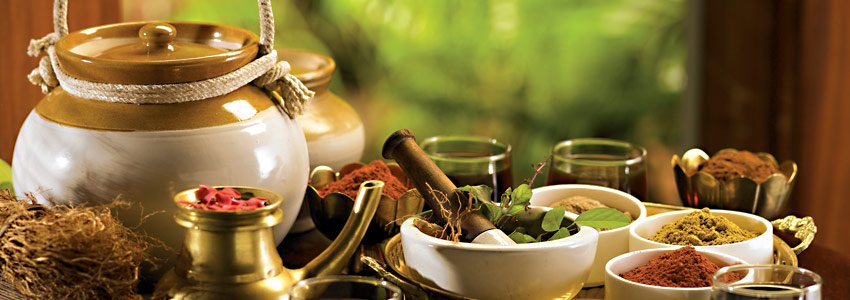
Natural antibiotics and antioxidants are indeed a way out for those who are often sick. Plus, one could advise heat treatment, because with the help of correctly selected temperature!
And also pay attention to immunomodulating drugs that have no contraindications. Recently, scientists have been working in this direction to help the human body quickly cope with diseases on its own. Excellent information on the right drugs for those who are often ill
Also pay attention to POLYOXIDONIUM. But back to the natural substances that improve immunity.
Along the way, I want to note that the article is general, recommendatory in nature, and the body of each person is individual, therefore, do not forget to consult a doctor before you start using very active substances obtained from the plants described below.
Of course, it’s simply impossible to cover everything about natural antibiotics in one article, so for now, let's dwell on two that I personally use constantly. Please pay attention to the keyword “constantly”. Nowadays, with our ecology, which is only getting worse year by year, and taking into account the fact that we are not getting younger, on the contrary, it is necessary to use active plant substances CONSTANTly, and for those who are often sick, it will be especially important to learn about KURKUME and CINNAMON.
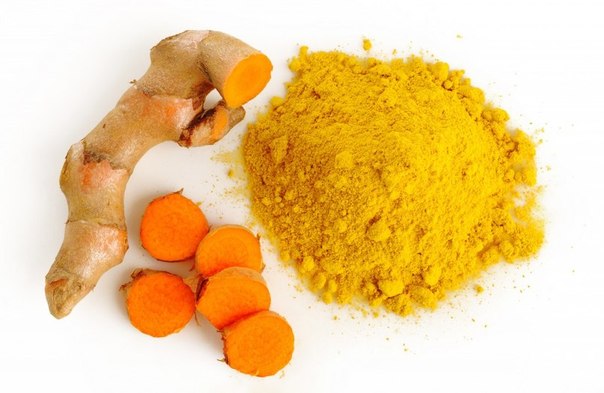
The beneficial properties of turmeric are undeniable, but not because of its content of such substances as: vitamins K, B, B1, B3, B2, C and trace elements: calcium, iron, phosphorus and iodine. They are there, but in microscopic doses. Turmeric is useful and unique because of curcumin, which has long been interested in medicine. During in vitro scientific experiments on cell cultures, curcumin has shown the ability to induce apoptosis of cancer cells without cytotoxic effects on healthy cells. The use of drugs containing curcumin not only stunted growth, but also prevented the emergence of new malignancies!
Due to the presence of other useful substances in turmeric, it is very useful for the digestive tract, metabolism, cleansing and rejuvenation of the body as a whole. Since turmeric is a plant from the ginger family, it is very similar in its properties to ginger. Their common property is to break down fats and speed up metabolism, which, by the way, also strengthens the body in the fight against diseases. Curcumin, which is part of turmeric, not only helps in the breakdown and absorption of fats, but also prevents the formation of adipose tissue.
Thus, a person who regularly consumes turmeric strengthens the immune system in two ways:
- he cleanses his body. And he, in turn, getting rid of toxins, unnecessary fats and their compounds with water (cellulite), ceases to accumulate toxic substances;
- exterminates pathogens due to the antioxidant and antimicrobial properties of turmeric.
Constantly consume turmeric - help the body grow younger, lose weight and not get sick.
Being a natural antibiotic that stimulates the brain, turmeric destroys proteins that block its work. Therefore, turmeric is used in the treatment of Alzheimer's disease and is recommended for controlling as an antidepressant. Especially useful are preparations from turmeric and other biologically active plants in the fight against. With the help of turmeric, they mitigate the effects of radiotherapy used in the treatment of cancer. Turmeric is also used in the rehabilitation of patients with cirrhosis. There are also cases where intense consumption of turmeric helped encephalitis patients survive.
But, all the positive properties of turmeric have not yet been fully studied, so experiments with this plant and the substances extracted from it continue and will continue for a long time. Here, in short, is some more information about what is still known about the beneficial properties and results of eating turmeric. She:
- it is a natural antiseptic and antibacterial agent used in the disinfection of cuts and burns.
- stops the development of melanoma and destroys its already formed cells.
- with cauliflower prevents or delays the development of prostate cancer.
- natural liver detoxifier.
- stops the development of Alzheimer's disease, removing deposits of amyloid plaques in the brain.
- can reduce the risk of leukemia in children.
- powerful natural remedy that helps with inflammation and does not give side effects.
- prevents the development of metastases in cancer patients with various forms of cancer.
- slows the development of multiple sclerosis.
- as a good antidepressant is widely used in Chinese medicine.
- in the process of chemotherapy enhances the effect of treatment and reduces the side effects of toxic drugs.
- possessing anti-inflammatory properties, it is effectively used in the treatment of arthritis and rheumatoid arthritis.
- able to stop the growth of new blood vessels in tumors and adipose tissues.
- research is underway on the effects of turmeric on pancreatic cancer.
- research is underway on the beneficial effects of turmeric on the treatment of multiple myeloma.
- relieves the condition with itching, boils, eczema, psoriasis.
- facilitates the healing of wounds and promotes the regeneration of affected skin.
Personally, I myself have already managed to experience the positive effects of turmeric. Specifically, this was expressed in increasing immunity, improving the functioning of the digestive tract and the rapid suppression of inflammatory processes that bothered more than two years. Moreover, turmeric was taken by me not so long, only about two months and in only two variations: powder and essential oil. Turmeric is available in different types: roots, powder, essential oil, turmeric supplements, etc. For your convenience, I give links to some sites where you can buy almost all of the options listed.
Where to buy turmeric
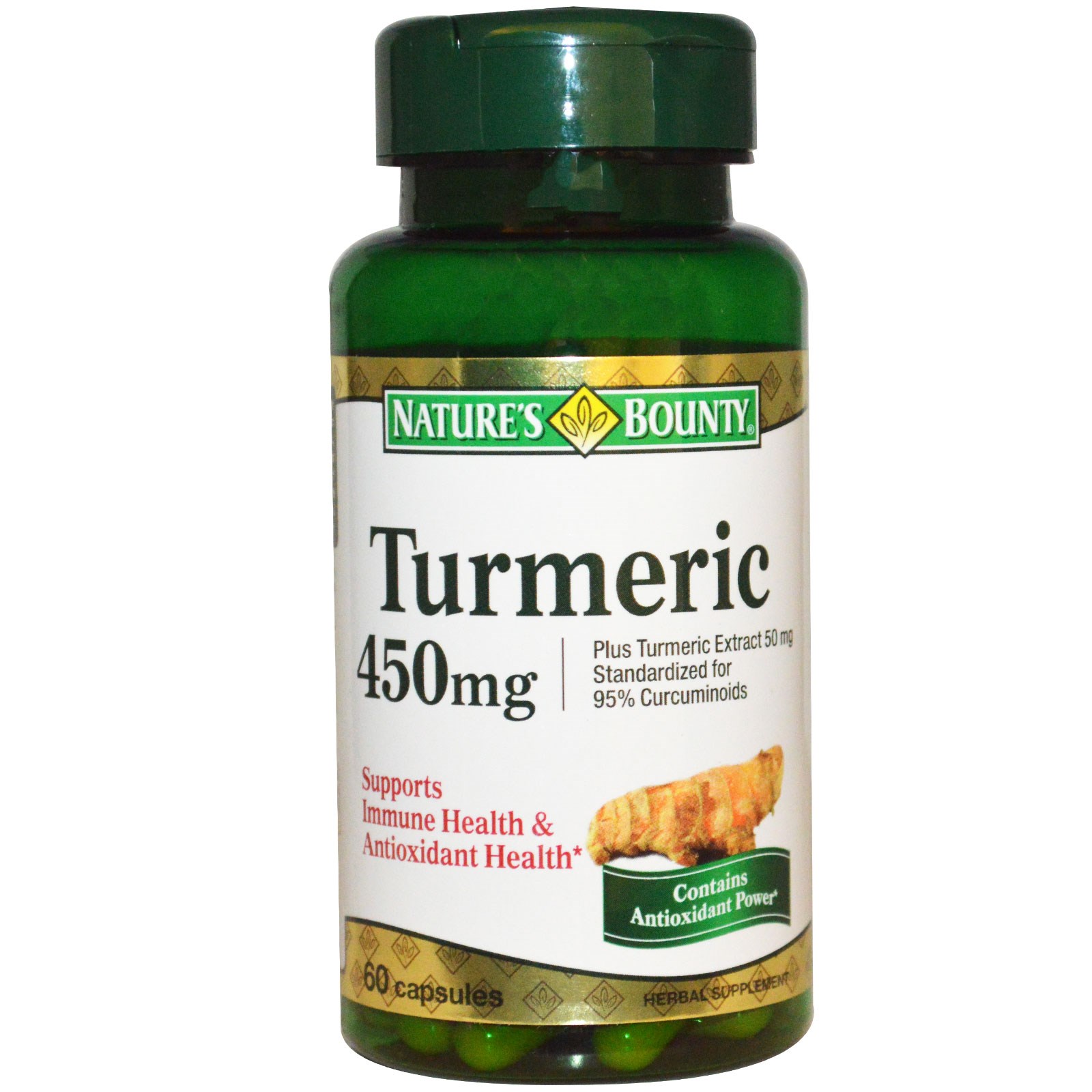
Turmeric is also called Turmeric - turmeric. This is its international name. This is how it is indicated in the composition of products, for example, as a dye. Turmeric is also called turmeric dietary supplement. Also the word turmeric on english language you should see in natural turmeric essential oil. If this word is not there, it means a fake before you, even if it says "100% natural." So where to buy? You can simply follow the links below, register, enter the desired product in the search and add the selected one to the basket. And as a bonus, still get a discount!
The team wishes you good health
(Visited 2,478 times, 1 visits today)
👇🏻 SEND THEME FRIENDS 👇🏻
- The diagnosis is not fatal, but terribly pesky. It is unpleasant to hurt, it is uncomfortable to hurt, especially if a person works. In addition to the fact that the victim is not feeling well, he still infects his colleagues, and if he draws up a sick leave, he immediately becomes objectionable to his superiors.
Contrary to the opinion of the employer, it is considered acceptable if a person has a cold 2-4 times a year, during seasonal epidemics. But when this happens “not according to plan” and much more often, it is necessary to act!
Low immunity and frequent colds
First of all, the cause of frequent colds is associated with a weakened immune system. The body simply loses its ability to defend itself against aggressive foreign agents - viruses, toxins, and in some cases even its own cells altered due to illness.
The reason for the decline in immunity can be anything: stress, poor nutrition, lack of exercise and even excessive hygiene, which completely relaxes the immune system and deprives it of the primary task of protecting the body from foreign agents.
In this case, the correct tactics will be, namely:
- the use of a complex of vitamins and minerals;
- hardening;
- physical training (fitness, yoga, etc.);
- proper nutrition;
- compliance with sleep and wakefulness;
- avoidance of contact with infection, especially during the spread of viral diseases.
Stress and frequent colds
Often people catch a cold. And if ARVI usually lasts about a week and can go away even without treatment, then in a state of nervous tension an independent recovery may not occur or drag on.
As a rule, in this case, diseases of organs and systems also join. Here you need a medical examination and doctor's recommendations.
In this case, get rid of frequent colds will help:
- avoidance of stressful situations;
- good rest;
- nutrition;
- healthy sleep.
Improper nutrition and gastrointestinal diseases
Loss of ability to resist viral infection is possible due to malnutrition: a large number of simple carbohydrates, fatty and refined foods, carcinogens (smoked meats and fried foods).
When the body does not receive the necessary nutrients, vitamins (especially C, A, E, D, group B), minerals, not only the general condition worsens, but the ability to resist a viral infection is also lost.
Therefore, a balanced diet with a sufficient amount of proteins, fats, carbohydrates, vitamins, minerals is important.
In the fight against frequent colds, peppermint, oranges, lemon, grapefruit, parsley, celery, onions, garlic, cauliflower, products containing zinc, as well as water, natural juices, teas and infusions on medicinal herbs are useful.
Drinking fluids prevents the appearance of dryness in the throat and nose, and also removes toxins from the body.
With diseases of the digestive system (gastritis, pancreatitis, helminthic infestations, etc.), medications are necessary.
Rejection of bad habits
In the fight against frequent colds, you should reconsider your habits and taste preferences. It is known that smoking, alcohol, drugs weaken the body's immune system, suppress the functions of organs and systems. It is worth remembering that secondhand smoke is just as harmful.
Electromagnetic radiation (mobile devices, computers), harmful noises also negatively affect health. Therefore, they should be eliminated if possible.
Medicines for the prevention of common colds
Avoid viral infections allow natural adaptogens - Eleutherococcus, Ginseng, Golden Root, Aloe, Echinacea. It is enough to use them 2 times a year.
Also, 2 times a year, you must drink a course of complex vitamins and probiotics.
Under conditions of stress, you can use tools to maintain a neuropsychic state - lemon balm or motherwort. And during the period of seasonal epidemics, take homeopathic remedies to increase immunity.
The use of immunomodulators, which is also effective in the fight against private colds, is possible only after the recommendation of a doctor.
Age: 42 years.
Education: 2nd Moscow Order of Lenin State Medical Institute named after N.I. Pirogov (now - N.I. Pirogov Russian National Research Medical University), residency in pediatrics, Research Institute of Pediatric Hematology.
Work: Head of the Department of Clinical Immunology and Allergology of the Federal Research and Clinical Center for Pediatric Hematology, Oncology and Immunology named after Dmitry Rogachev of the Ministry of Health and Social Development of Russia, Professor of the Department of Hematology, Faculty of Advanced Medical Studies of the Russian National Research Medical University named after N.I. Pirogov.
Regalia and titles: doctor of medical sciences, professor, author of more than 100 publications, member of the Russian Association of Allergologists and Clinical Immunologists, European Society of Immunodeficiencies.
About types of immunodeficiencies
Immunodeficiency is a condition accompanied by significant and long-term changes in the immune system and serious symptoms. There are secondary immunodeficiencies, and there are primary (PID). Primary are genetically determined. As a rule, symptoms occur at an early age, but sometimes they can occur in adults. But in any case, the manifestations will be very difficult. Primary immunodeficiencies are extremely rare. Many such diseases can be confirmed by detecting a gene defect. But while, however, mutations have not been found for all PIDs, the search continues.
Secondary immunodeficiencies are those that have arisen during life under the influence of some factors leading to persistent changes in immunity, possibly for life, but not always. Secondary immunodeficiency can pass without treatment: if, for example, the exposure factor is gone. PID must be treated.
About AIDS and other secondary immunodeficiencies
According to the international classification, secondary immunodeficiencies are considered serious changes in immunity that occurred under the influence of chemotherapy, radiation, after transplantation of organs and tissues (which is accompanied by immunosuppressive therapy), and loss of protein (the main tool used by the immune system). The latter option may occur when a person has some kind of kidney disease and the protein leaves with urine. Or when the patient has a severe bowel disease, often congenital, in which there is prolonged diarrhea, which also causes protein loss.
AIDS also refers to secondary immunodeficiencies, but it stands somewhat apart. And all over the world, and in Russia, individuals are usually involved in this syndrome. But, of course, we have some kind of interaction with them, because, for example, a person with symptoms may come to us as in primary immunodeficiency, but it turns out that he has AIDS. I saw a lot of such children.
About false diagnoses
In Russia, the concept of “secondary immunodeficiency” has expanded indecently: we often hear that each person can detect secondary immunodeficiency. And this, in fact, only because he lives in a world where there are many viruses, bacteria and fungi. I am not a supporter of this point of view. If a person has a runny nose, this does not mean that he has a serious disease of the nasal cavity. It’s just that the virus got on the mucous membrane, it needs to be removed - that snot flowed. The virus will go away - the snot will stop. Similarly, most changes in immunity are adaptive in nature - this does not mean that the immune system is not in order.
There are criteria by which the presence of immunodeficiency can be suspected. Its main manifestation is the presence of infections, often and severely proceeding. It’s normal if an adult suffers from mild infectious diseases four to six times a year, which heals quickly, although he can sometimes have bronchitis or pneumonia requiring antibiotics. But if he uses antibiotics, and he doesn’t manage to recover, this is already suspicious.
About the true causes of infectious diseases
Immunodeficiencies are rarely manifested by frequent colds. Usually this is a sensitivity to more serious infections. There is a whole range of conditions that can mimic immunodeficiencies. For example, if a person has a common cold and a sore throat twice a month, the most common cause is reflux - acid reflux from the stomach, which washes away the protective layer of the mucous membrane. In adults, this sometimes turns into chronic tonsillitis: the infection has already settled in the tonsils, it is difficult to “drive out” from there, and it manifests itself with any minimal cooling, stress. By and large, this has nothing to do with immunity. Yes, in a sense, local immunity is violated, but it is always important to understand the reason so that it can be eliminated. If a person is simply given some kind of immunomodulator, then we will strengthen local immunity for two days, but soon everything will return to its previous course. Such false diagnoses create many problems of various kinds: the real reason is not sought after.
If a person has a chronic infection, from which he cannot get rid of any antibiotics, then the cause must be established purely individually. Often, a chronic infection occurs due to some kind of congenital defect, a structural defect that prevents the organ from functioning normally. The reason may be a violation of the pH environment, blood supply, as in diabetes, etc. Immunodeficiencies rarely cause chronic infections of one organ.
About "weak immunity"
There is no such thing as "just weak immunity." If we really believe that it is weak, then this is the beginning of the way: you need to look at laboratory tests. In some cases, significant changes are revealed there, and then we try to make a specific diagnosis and, in accordance with it, try to help the patient. If it turns out that all the tests are absolutely normal, but the person, according to our concepts, is sick more often and harder than he should be, then we just until the last look for the cause of the violation of the immune system by some more complex methods. In addition, new gene breakdowns are constantly being discovered. However, as already mentioned, often the cause of infections is not at all immunological factors. And in such cases, the immunologist does not have to go to the root cause - any doctor with common sense can do this. Every doctor is also able to suspect immunodeficiency. But, of course, in order to make an accurate diagnosis, if we are talking about this rare disease, we need appropriate experience.
About immunomodulators
I practically do not prescribe immunomodulators, although many do. Probably someday I will change my mind, but so far no one has convinced me that immunomodulators are helping someone. I suspect that among these drugs there are those that are of real benefit. But we have certain Russian features: for example, clinical trials of drugs, including immunomodulators, are very poorly conducted. Any foreign drug has rather stringent requirements in this sense. We can do some research formally - the fact that fifteen alcoholics and three children participated there does not bother anyone.
When they write on most immunomodulators that they have no side effects, I can hardly believe it: either we do not achieve therapeutic concentration (then why do we use such a drug at all?), Or these manifestations were not very well looked for. In addition, our immune system is a finely balanced mechanism. Most substances "stimulate" several of its components at once. And after all, one can also stimulate that which then will not be felt in the best way. For example, there was one bad cell in the body (conditionally) - the immune system successfully fought with it. And if they become one hundred and fifty? It is difficult to imagine such a highly selective immunomodulator that does not affect the other cogs of our immune system.
The benefits of infectious diseases
If a patient comes to me and says that another doctor has been prescribed an immunomodulator, I will not cancel anything, but simply express my opinion about this problem. Whether to continue taking the immunomodulator is a personal matter for the patient. Just the older I get, the less categorical in me. Immunomodulators that are based on the use of bacterial wall proteins and are foreign, that is, they have undergone serious clinical studies, have little effectiveness, but there is one. In rare cases, I prescribe some drugs from this group. This happens when the patient, even after listening to all the arguments, really wants to be treated with something. But I warn you - do not expect a miracle, this is not a cure for all diseases: maybe instead of five times you get sick four. A healthy lifestyle, washing your hands, good nutrition - all this reduces the incidence of various infections, but people cannot help but be sick at all. For this to happen, we must have specific immunity to all infections. It appears in a person when he has at least once met with this infection.
Drugs like Echinacea only enhance local immunity. They can slightly shorten the period of acquaintance with the infection, accelerate recovery. Vaccines cover only a small number of infections. Therefore, children should be sick. Moreover, in children who are limited in contacts with potential pathogens (only child - they do not let anyone in, everything is sterile), most often they develop allergic diseases, because there are conditional scales. When we are born, our immunity is so arranged that we are more prone to allergies. When we encounter infections, these scales are leveled. If children do not get sick, they have a much longer, and maybe forever, predisposition to allergies.
About "lost" immunity
Autoimmune diseases occur when the immune system, roughly speaking, gets lost. In normal condition, he must recognize his own and other people's cells. Therefore, it is so difficult to transplant a heart, kidney, or any other organ: the body immediately understands that this is not his, and tries to get rid of such an object. But initially this system was invented by nature mainly to fight infections. With autoimmune diseases, the recognition mechanism is violated, the body perceives its own as someone else's and attacks. The fight can begin with different cells or with cells of any one kind.
We deal with autoimmune diseases, but by and large not very much. Historically, these pathologies are more often referred to as cardiology, rheumatology and hematology. However, in our patients with immunodeficiencies there are autoimmune diseases - and, by the way, much more often than in ordinary people.
About ignorance
In communication with patients and their relatives, we have one significant problem that my foreign colleagues cannot understand at all. The fact is that many patients with serious diagnoses do not listen to us. The problem is not a lack of confidence in specific immunologists: we suggest being examined at any other place, including abroad, to confirm the diagnosis; we say: "Do something, otherwise the child will die." “No, we are fine.”
One boy, for example, is not being treated because his parents said: “We used to live wrong, so he got sick. And now we will live right, and he will recover. ” I don’t even know what they had in mind. This happens when the parents see that the child is seriously ill, but more often, of course, when the disease only debuted and the severity of the diagnosis is not obvious. That is, for treatment, the situation in which the patient arrives early is good, but there is such a nuance - it is difficult for parents to believe that there is a disease.
It's not even that they think that we want to cash in on them or experiment, it’s hard for them to turn their lives upside down. And the word "immunodeficiency" is pretty well-worn. I say, for example: "Your child has immunodeficiency." “Yeah. But what does he get sick with? ”Immunodeficiency is after all. But in fact it is a very serious illness.
About the future of immunology
Immunology is a rather complex field, and our patients do not recover very often. Therefore, there are not many immunologists: everyone wants to see the result of their work, and it is difficult to live with the thought that most of your patients have already died. Of course, now the situation is better than before: there are new developments, treatment methods. I chose this area because it is complex, by and large few people study and therefore interesting.
Immunology is not only a clinical science, but also a theory that is constantly changing. After 20 years, perhaps we will laugh at the knowledge that we now have. It is possible that then the understanding of this whole problem will be different. For example, recently we began to identify cases where the immunogram - an analysis showing the state of the immune system - is normal, but using various tricky methods it turns out that a person has immunodeficiency.
Defects began to be detected in which sensitivity was increased only to certain groups of microbes, and not, as is usually the case with immunodeficiencies, to everything at once: microbes, fungal infections, viruses. Recently, for example, it turned out that herpetic encephalitis (brain damage by the herpes virus) is also immunodeficiency, a specific small defect that causes a similar condition. Such patients tolerate other infections normally.
A group of immunodeficiencies was also discovered, which are manifested by increased sensitivity to tuberculosis, various mycobacteria and a small number of other infections, for example, salmonella. BCG vaccinations are given to almost all people, and this is nothing but mycobacteria. She is weakened, but this is so from the point of view of ordinary immunity. With the pathology we are talking about, mycobacteria can cause the corresponding diseases.
Relatively recently, a girl came to us, whose main problems were enlarged cervical lymph nodes, constant temperature, and periodically appearing rashes. The girl also suffered salmonellosis, but, as I understand it, after treatment she did not receive two necessary crops, which should have given a negative result. On the whole, the picture was rather strange: it is difficult to assume that a person has several diseases at once, therefore in such cases one always wants to find one, common cause of problems.
During the examination, it turned out that the girl salmonella is sown from everywhere: from the intestines, mucous membranes of the nose, blood. The patient had an active inflammatory reaction, the body tried to get rid of all these microbes. That is why enlarged lymph nodes, temperature, rash. However, standard immunological tests did not help with the diagnosis. With the help of foreign colleagues, we were able to confirm the recently described and very rare genetic defect, which causes increased sensitivity to salmonella, as well as mycobacteria. With the help of more intensive and longer courses of antibiotics, we were able to take control of the situation.
About diagnostics
With the knowledge of immunology in ordinary doctors, everything is very bad. This, of course, is a complex science, but it can be simplified. However, unfortunately, there are not many universities in which immunology is taught in a good volume. And all that is needed is for the doctors to know that they can simply, like switch men, send such and such patients to us.
The flip side of the medal of lack of knowledge in immunology is that quite often patients without immunodeficiency are referred to us. But let it be better for us to send 10 thousand children without this disease, than we will miss one patient with PID. Theoretically, in Russia there are about 15 thousand of such patients, and perhaps only a thousand have been found. And you need to find the rest before they die.
Photo
Other articles
How to tell children about immunity
A presentation for schoolchildren about what immunity is, what violations occur, how children with primary immunodeficiency live, and how they can be helped.
Primary immunodeficiency. X-linked lymphoproliferative syndrome
X-linked lymphoproliferative syndrome is the primary immunodeficiency in which in male patients there is a violation of the immune response to the Epstein-Barr virus.
Primary immunodeficiency. Autoimmune lymphoproliferative syndrome
Autoimmune lymphoproliferative syndrome - primary immunodeficiency, in which there is a chronic non-malignant increase in lymph nodes, liver and spleen, autoimmune pathology, and an increase in the level of immunoglobulins in the blood.
Primary immunodeficiency. Dee Georgie's Syndrome
Di Georgie's syndrome is a congenital defect that leads to hypoplasia or the absence of a thymus (thymus gland) in combination with malformations of large vessels, heart, parathyroid glands, facial bones of the skull and upper limbs
Optimization of diagnosis and treatment of hereditary angioedema in adults.
Features of the rare form of primary immunodeficiency, clinical manifestations, immunological disorders and principles of therapy for hereditary angioedema. Individual self-monitoring plans for each patient and evaluating their effectiveness. Karaulov A.V., Sidorenko I.V., Kapustina A.S. The first Moscow State Medical University. I.M.Sechenova, Moscow
Hereditary angioedema
Hereditary angioedema is a rare, life-threatening disease that belongs to the group of primary immunodeficiencies. The reason is a general level insufficiency or a decrease in the functional activity of the C1 inhibitor of the complement system. The life of such patients becomes a nightmare: they never know where and when edema begins. Patients often experience fear of another attack, they are characterized by a feeling of loneliness, a feeling of hopelessness and endless problems at work, in school and at home.
Primary immunodeficiency. Wiskott-Aldrich Syndrome
Wiskott-Aldrich Syndrome is a primary immunodeficiency condition affecting both T-lymphocytes and B-lymphocytes. Platelets, cells that help stop bleeding, are also severely affected. The information in the article is intended for patients and their families and should not replace the recommendations and appointments of the attending physician and immunologist-clinician.
Primary immunodeficiency. X-linked agammaglobulinemia
In patients with X-linked agammaglobulinemia, the main defect is the inability of the B-lymphocyte precursors to mature to the state of B-lymphocytes, and then plasma cells. Since these patients do not have cells that produce immunoglobulins, severe immunoglobulin deficiency occurs. The information in the article is intended for patients and their families and should not replace the recommendations and appointments of the attending physician and immunologist-clinician.
Primary immunodeficiency. SCIN - severe combined immune deficiency
Severe combined immune deficiency (SCID) - the most difficult diagnosis on the list of primary immunodeficiencies - is a rare syndrome due to various genetic factors and combining the lack of functions of T and B lymphocytes (and in many cases also the lack of function of natural killer cells or NK lymphocytes) . These disorders lead to extreme sensitivity to severe infections. The information in the article is intended for patients and their families and should not replace the recommendations and appointments of the attending physician and immunologist-clinician.
12 warning signs of primary immunodeficiency
PID is not AIDS. Primary immunodeficiency is a congenital disorder in the immune system of a genetic nature. An indication for referral to an immunologist is a combination of recurrent viral and bacterial infections or the presence of severe, protracted bacterial infections. The data of the World Health Organization indicate that the frequency of acute respiratory viral infections 8 times a year is a normal indicator for preschool and primary school children attending childcare facilities.
Often sick children: what are they really sick with?
Infections of the ear, throat, nose, as well as bronchopulmonary infections are the main list of diseases in childhood. WHO data indicate that the frequency of acute respiratory viral infections 8 times a year is a normal indicator for preschool and primary school children attending childcare facilities. An indication for referral to an immunologist is a combination of recurrent viral and bacterial infections or the presence of severe, protracted bacterial infections.
Immunodeficiencies in children.
The diagnosis of "immunodeficiency" is becoming increasingly popular among doctors of different specialties. It seems that often doctors, instead of clearly determining the diagnosis and treating the disease in accordance with the approved standards, prescribe immunotropic drugs without presenting the effect and consequences of such therapy.
Diagnosis of families with immunodeficiency
Primary immunodeficiencies are inherited diseases in which parents carry the diseased gene and pass it on to their children. As a result, the child develops a disease. Currently, in connection with the development of genetics and immunology, many genes are known in which mutation leads to the development of various forms of primary immunodeficiencies.


